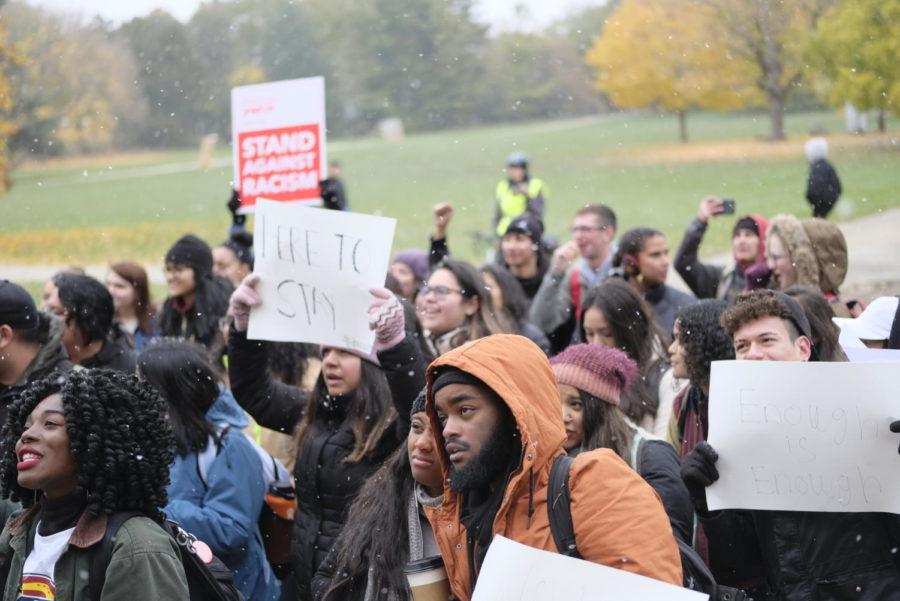Berch: Who do you protect?
Columnist Emily Berch raises the question, “Who do you protect?” in reference to the chants at the “Students Against Racism” protest Wednesday.
October 31, 2019
Iowa State students stopped traffic Wednesday as they marched at the intersection of Union Drive and Lincoln Way, chanting things like “No Nazis! No KKK! No fascist USA!” and “Who do you work for? Who do you protect?”
As they marched from the Memorial Union to Beardshear, protesters also asked people to sign a list of demands, which included things like instituting a zero-tolerance policy for racism and anti-semitism at Iowa State.
The protest, and a coalition of students speaking at the Student Government meeting that night, comes after a tidal wave of racist incidents at Iowa State throughout recent months, adding to the floodwaters of white supremacy that have been apparent on campus for much longer.
President Wendy Wintersteen sent out an email the morning of Oct. 23 condemning racism and bigotry on campus, but it came at a point when so much had happened that I’m unsure which instance of racism it was meant to address. Was it meant to address the more public vandalism in the Bean house in Geoffery Hall but was coincidentally timed so it came shortly after a Student Government adviser’s Instagram went public?
Was the administration hoping words of comfort would be enough for students who saw “HH” for “Heil Hitler” chalked on Central Campus? Was that email supposed to be enough for students of color, Jewish students, trans students or anyone else whose identity was threatened by messages all across campus throughout the past month?
I’d love to give the administration some benefit of the doubt. Maybe they’re working tirelessly behind closed doors to eliminate white supremacy from our campus, but it’s not as if this is a new problem. The administration certainly wasn’t caught off guard by racism on campus.
Iowa State conducted campus climate surveys in 2004 and 2018, which unequivocally demonstrated through both qualitative and quantitative data that racism is a problem at Iowa State. When the results were announced in 2018, a graduate student confronted Wintersteen about the university’s inaction on these things.
She tried to comfort him by promising conversations to take place throughout the fall, but as he left he reminded her again that it was time for action, and once he was gone, she repeated to the crowd that we have to begin with conversations.
But you can’t have conversations when students don’t even feel safe walking to campus.
When that hate goes unchallenged by the administration, it grows comfortable here. It’s chalked on the sidewalks; it’s called from passing cars.
How bold does it have to grow before enough is enough? Does it have to drive through a crowd of protesters? What if it had on Wednesday, as students marched?
Students are showing up to protect and stand up for each other, but that’s what the administration should be there for.
To its credit, the Campus Climate Undergraduate Student Experience Committee hosted a forum in February, seeking feedback on its planned responses to the survey results. Unfortunately, only one student attended and none offered feedback.
So, students, I’m hoping we stay engaged this time. I’m hoping that when the news moves past the events that fueled the protests, our activism doesn’t.
Ultimately, though, I’m hoping the administration sees this problem for what it is. We can protest and petition, but as long as the administration stays quiet, white supremacist beliefs will be protected here on campus.
So, Iowa State, who do you protect?

















